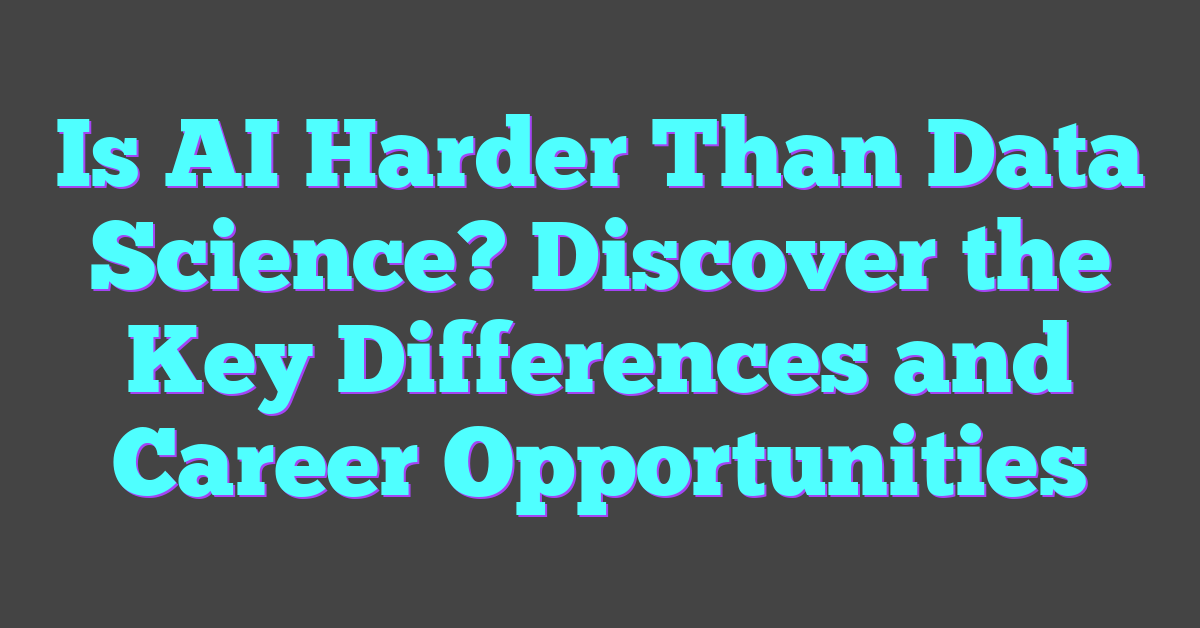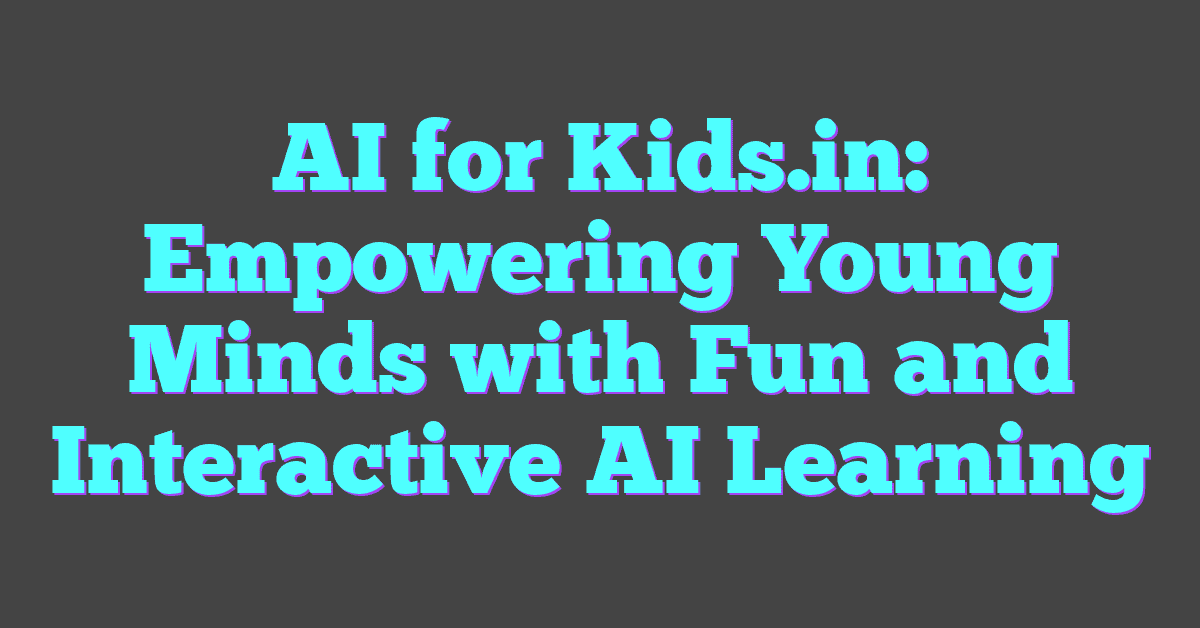In the ever-evolving landscape of technology, two fields often spark curiosity and debate: artificial intelligence (AI) and data science. While both share common ground in their reliance on data and algorithms, they diverge in complexity and application. Many wonder, is AI really harder than data science?
AI, with its focus on creating machines that mimic human intelligence, demands a deep understanding of machine learning, neural networks, and natural language processing. On the other hand, data science revolves around extracting insights from data using statistical methods and analytical tools. Both fields require a robust skill set, but the challenges they present can differ significantly. Understanding these differences can help aspiring tech enthusiasts decide which path aligns best with their interests and career goals.
Defining AI and Data Science
Artificial intelligence (AI) and data science play pivotal roles in the tech industry. They often overlap but serve distinct purposes.

Core Concepts of Artificial Intelligence
Artificial intelligence (AI) aims to create machines mimicking human intelligence. Experts focus on machine learning (ML), neural networks, and natural language processing (NLP).
Machine Learning
Machine learning is central to AI. It enables systems to learn from data, improving performance over time without explicit programming. Supervised, unsupervised, and reinforcement learning are its three main types.
Neural Networks
Neural networks, inspired by the human brain, form the backbone of deep learning. These networks contain multiple layers that process inputs, identify patterns, and produce outputs.
Natural Language Processing
Natural language processing allows machines to understand and interact using human language. It’s essential for applications like chatbots, language translation, and sentiment analysis.
Essentials of Data Science
Data science focuses on extracting insights from data. It involves statistics, programming, and domain knowledge to analyze and interpret vast datasets.
Data Analysis
Data analysis involves examining datasets to uncover patterns, correlations, and trends. Techniques include descriptive, diagnostic, predictive, and prescriptive analytics.
Statistical Methods
Statistical methods provide tools for data science. They help in hypothesis testing, data inference, and drawing meaningful conclusions from datasets.
Analytical Tools
Analytical tools, such as Python, R, SQL, and various visualization software, are crucial. They enable data scientists to manipulate data, perform analyses, and create visual representations of findings.
By understanding these core concepts and essentials, individuals can better navigate the fields of AI and data science, making informed decisions about their careers.
Comparing Complexity
Diving into artificial intelligence (AI) and data science reveals varying complexities that professionals encounter. Understanding these can help delineate the challenges in each field and guide career decisions.
Technological Challenges in AI
AI presents numerous technological challenges. Model complexity, algorithm optimization, and computational power are significant factors. Neural networks, particularly deep learning models, require extensive tuning and substantial computational resources (e.g., GPUs, TPUs). Issues like overfitting and underfitting need addressing to ensure model accuracy. Moreover, AI systems integrating machine learning and natural language processing must handle vast and diverse datasets, demanding sophisticated preprocessing and algorithmic adjustments.
Consider autonomous vehicles. These AI systems continuously learn from their surroundings, necessitating real-time data processing and adaptation to unpredictable scenarios. This complexity underscores the necessity for specialized knowledge in machine learning frameworks and hardware acceleration techniques.
Data Handling Difficulties in Data Science
Data science, while centered around data analysis, grapples with its own set of complexities. Data collection, cleaning, and preprocessing are foundational yet time-consuming. Handling unstructured data from varied sources (e.g., social media, customer reviews) introduces additional complications. Ensuring data quality and integrity is critical, necessitating rigorous validation methods.
For instance, financial analysts often deal with massive datasets that include anomalies and outliers. Employing statistical methods to detect and correct these irregularities is essential to derive accurate insights. Moreover, data scientists must utilize analytical tools (e.g., Python, R, SQL) efficiently to transform raw data into actionable intelligence.
By comparing these aspects, it’s clear that while both fields present unique challenges, AI’s demand for computational resources and algorithmic optimization contrasts with data science’s focus on data handling and preprocessing.
Educational Requirements
Artificial intelligence (AI) and data science both demand unique academic qualifications and skills for success. While each field shares some overlap, they diverge significantly in specific areas of expertise.
Skills Needed for AI
AI experts often possess strong programming skills. Languages like Python, C++, and Java are commonly used for creating algorithms and models. A solid foundation in mathematics, especially linear algebra, calculus, and probability, is crucial for understanding machine learning algorithms and neural networks. Knowledge of neural networks, deep learning frameworks like TensorFlow and PyTorch, and experience in algorithm optimization are essential competencies.
To stay updated, professionals often engage in continuous learning through online courses, workshops, and conferences. Real-world problem-solving involving large datasets and complex models is a day-to-day task for AI practitioners, requiring a blend of theoretical knowledge and practical application.
Skills Needed for Data Science
Data science professionals also need programming skills, particularly in Python and R, for data manipulation and analysis. Mathematical aptitude is important, with a focus on statistics, probability, and linear algebra to build and validate models. Strong capabilities in data handling, including data cleaning and preprocessing, are necessary given the vast amounts of unstructured data they encounter.
Experience with data visualization tools like Tableau, PowerBI, or Matplotlib is vital for presenting insights. Data scientists utilize machine learning libraries such as Scikit-learn, and they must be adept at using databases and querying languages like SQL to manage data.
Both fields require continuous upskilling, but they each focus on different aspects of the tech industry—AI on complex algorithm development and optimization and data science on comprehensive data analysis and interpretation.
Industry Applications
Artificial intelligence (AI) and data science find applications in many industries, transforming operations and driving innovation.
AI in Various Sectors
AI powers advancements in sectors like healthcare, finance, and transportation. In healthcare, AI enhances diagnostic accuracy using machine learning algorithms on medical images, according to a study published in Nature Medicine. Financial institutions utilize AI for fraud detection, employing neural networks to analyze transaction patterns. In transportation, autonomous vehicles rely on AI to process sensor data and make real-time decisions, enhancing road safety and efficiency.
Data Science Across Industries
Data science propels industries by uncovering insights from vast datasets. Retail companies use data science to optimize inventory management, utilizing predictive analytics to forecast demand. In marketing, data science enables personalized advertising by analyzing consumer behavior data. The manufacturing sector benefits from predictive maintenance, where data models predict equipment failures, minimizing downtime and operational costs.
By integrating AI and data science, industries achieve significant improvements in efficiency, decision-making, and innovation.
Career Prospects and Growth
Career prospects in AI and data science are expanding rapidly due to their transformative potential in various industries. Professionals in these fields are in high demand, with opportunities for growth and advancement.
Job Opportunities in AI
AI specialists find roles in industries like healthcare, finance, and transportation. They work on developing intelligent systems that can perform tasks that usually require human intelligence. For example:
- Machine Learning Engineer: Focuses on creating algorithms that allow machines to learn and make decisions.
- AI Research Scientist: Conducts research to advance AI technology, often working in academic or corporate labs.
- Robotics Engineer: Designs and constructs robots that can perform a variety of tasks.
- Computer Vision Engineer: Specializes in enabling machines to interpret visual information from the world.
According to the Bureau of Labor Statistics, the demand for AI professionals is expected to grow by 31% from 2020 to 2029. These roles not only offer high salaries but also provide opportunities to work on cutting-edge technology that impacts society.
Job Opportunities in Data Science
Data science professionals analyze and interpret complex data to help organizations make informed decisions. Their roles are crucial in industries like retail, marketing, and manufacturing. Examples of job titles include:
- Data Scientist: Uses statistical methods and machine learning to analyze and interpret data.
- Data Analyst: Focuses on interpreting data to generate actionable insights.
- Data Engineer: Designs and manages the infrastructure needed to store and process large datasets.
- Business Intelligence Analyst: Uses data to improve business processes and strategies.
Data science roles have a projected growth rate of 15% from 2020 to 2029, according to the Bureau of Labor Statistics. These positions offer strong salaries and diverse opportunities across different sectors, making it a promising career path.
By understanding the career prospects and growth opportunities in AI and data science, one can make an informed decision about which field to pursue based on their interests and strengths.
Conclusion
Choosing between AI and data science depends on one’s interests and career goals. Both fields offer exciting opportunities and significant growth potential. AI focuses on creating intelligent systems while data science revolves around analyzing data to derive insights. Each has its own set of challenges and rewards.
Aspiring professionals should consider their strengths and passions when deciding which path to pursue. Whether it’s the intricate algorithms of AI or the analytical prowess of data science both fields are essential in today’s tech-driven world. So dive in and explore what excites you most.
Frequently Asked Questions
What is the main difference between AI and data science?
AI focuses on replicating human intelligence by developing algorithms that can perform tasks like speech recognition, decision-making, and problem-solving. Data science, on the other hand, is about extracting valuable insights from data and using statistical and computational techniques to interpret this data.
What educational background is necessary for a career in AI?
A career in AI typically requires a strong foundation in computer science, mathematics, and understanding of advanced algorithms. Degrees in computer science, engineering, or related fields, and specialized courses or certifications in AI are highly beneficial.
What skills are important for a data scientist?
Key skills for a data scientist include proficiency in programming languages like Python or R, statistical analysis, data visualization, and familiarity with machine learning algorithms. Strong problem-solving abilities and knowledge in domain-specific areas are also valuable.
In which industries are AI and data science being applied?
AI and data science are being applied across various industries, including healthcare, finance, retail, manufacturing, and transportation. These technologies are used to optimize operations, improve customer experiences, predict trends, and drive innovation.
What are some common job titles in AI and data science?
Common job titles include Machine Learning Engineer, Data Scientist, Data Analyst, AI Research Scientist, and Business Intelligence Analyst. Each role has specific responsibilities and requires different skill sets related to AI and data science.
What is the job outlook for careers in AI and data science?
The job outlook is highly positive, with rapid growth projected in both fields. Demand for professionals skilled in AI and data science is increasing due to the expanding implementation of these technologies in various sectors. This trend is expected to continue, offering numerous career opportunities.
How can I choose between a career in AI and data science?
Consider your interests and strengths. If you enjoy developing intelligent systems and working on algorithms, AI may be a better fit. If you prefer analyzing data and extracting insights to inform decisions, data science might be more suitable. Evaluate the roles, responsibilities, and growth potential in each field to make an informed decision.




